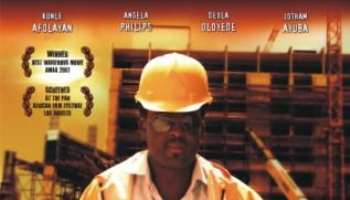Nollywood: Addressing Content Through Literary Adaptations
Decades ago, when the movie Living in Bondage and the many others before it were shot, little did practitioners in the industry know that they would pave way for the strides in the industry today. The developments in the industry notwithstanding, critics say Nollywood, as the Nigerian movie industry has come to be known, cannot rub shoulders with its counterparts in other parts of the world.
To aid its development, several groups have tried to organise stampedes and come up with findings that will give the industry a boost. One of such is the 81st quarterly art stampede organised by the Committee for Relevant Arts (CORA). Held at the National Theatre on Sunday March 20, the stampede it had the theme 'Promoting a Closer Cooperation between Our Literature and Our Motion Picture'.
With the presence of an apparent lack of collaboration between the motion picture and the literary arts, it becomes necessary to bridge the divide by identifying possible areas of fusion between both fields.
Frontline filmmaker, Tunde Kelani, tried to identify the challenges imminent in literary adaptations of movies in Nigeria. In his opinion, home video and filmmaking are two different things altogether. Citing some of the causes of the setbacks and lack of development being experienced in the movie industry today, Kelani said the Nigerian movie industry did not develop on intellectual premise but on that of entrepreneurship. This is evident in the fact that most filmmakers place the gains they would incur in making movies above quality thereby fostering mediocrity.
“What is presently going on is a systematic degradation of the industry itself. Stressing on the intellectual point, Kelani further argued that producers and viewers alike have stopped reading so the audience expected to enjoy the adaptations don't care about the literary ability of both the writers and the filmmakers.
“To adapt a literary work, one has to have a love for the writer so as to add value to the work by developing it into another media.”
Compared to foreign flicks from Europe, America and sometimes, even Asia, analysts have always condemned the Nigerian movies, especially in terms of plot, characterisation, picture and audio quality, as well as sound tracks. The news of Nollywood being the third largest movie producer in the world was greeted with skepticism. It becomes more so when it was cleared that Nollywood is the third largest in terms of quantity. In that case, it does not matter whether movies produced meet up to international standards. All that is important is that they are turned out in large numbers.
For literary giant and poet who only recently turned 60, Odia Ofeimun, who confessed to being what he calls totally illiterate on the whole issue, despite the low ratings Nollywood has, he loves the Nigerian movie industry because it tells our story our own way.
“If you want to understand what the Nigerian story is all about, all you have to do is watch a movie,” he said.
Though, he said, poverty and lack of infrastructure affect the type of stories being told as Nigeria does not have the infrastructure to sustain a proper film industry, the fact that Nigeria churns out hundreds of films is a plus to Nollywood. “To be able to have the kind of culture to watch a particular film, you have to create the society that can make that possible.”
Ofeimun also made a case for the rested cinema culture in Nigeria. The importance of cinemas to the development of the industry, he said, cannot be ruled out. “People will have to be brought to the cinema houses. Unfortunately, the cinema houses are not there. There are also very few bookshops in the market.”
Analysts are quick to argue that the Nigerian film industry cannot compete with its counterparts in the western world because it is not as old as they are but magazine publisher and writer Toni Kan admits the fact that Nollywood is young. Though the industry is young, he asks where it is headed? In terms of adaptations, Toni Kan, who is known for his stint in popular soft sell magazine, Hints pointed out that almost all the winning movies in the 2010 edition of the Oscar Academy Awards come from book adaptations.
“If we must aspire to be like Hollywood, we must be ready to do what Hollywood does.”
By not just toeing their line but also finding out how they got there, he argued at the event, we can be placed at par with some of the biggest movie industries in the world in terms of quality of movies produced.
Rising to the defense of Nigerian moviemakers was Francis Onwuche, a stage actor turned film director. Though he said he is excited about where Nollywood started, he also expressed optimism that the industry will improve with time.
“People make the mistake of trying to compare Nollywood with Hollywood.”
This is not proper as he said Nollywood is still in its development stage. He also pointed out that filmmaking, as against what people say it is, is entrepreneurship because one must make money out of it. “You don't expect people to go into moviemaking only to incur losses. When you hear of great Hollywood productions, we discover that they are studio commissioned works.”
Though that kind of atmosphere does not exist in Nigeria, he argues, we will get there someday because it is progressive.
The stampede organised by CORA was to celebrate the 80th birthday of Mabel Segun, a broadcaster and literary genius. Segun, as far back as 55 years ago, was into producing books, teaching while at the same time broadcasting. She freelanced in broadcasting while she worked full time as a civil servant, and then went to make a career out of broadcasting. Her artistic journey has come to be seen as fusion between literary and electronic media. With the likes Cyprian Ekwensi and Chinua Achebe known to have worked in the electronic media and some of the earliest drama on TV being Soyinka's plays, it becomes clear that Mabel Segun's generation did a lot of double takes, an issue that is absent in today's movie industry. Mabel is one literary icon who delved into both fields to a significant degree.
Considering that one of the key challenges of the Nigerian film industry is that of content, the organisers are therefore encouraging the practitioners of the industry to borrow from the literary field not only to fuse the gap between both fields but also finding a solution to the issue of poor content.
By Ovwe Medeme , Reporter, Lagos
Latest News
-
 Division Among Nigerians As Cubana Chief Priest Is
Division Among Nigerians As Cubana Chief Priest Is -
 Cubana Chief Priest Pleads Not Guilty To Charges O
Cubana Chief Priest Pleads Not Guilty To Charges O -
 BBNAIJA Star, Mercy Eke Hospitalized After Partyin
BBNAIJA Star, Mercy Eke Hospitalized After Partyin -
 Regina Daniels Pays Tribute To Late Junior Pope
Regina Daniels Pays Tribute To Late Junior Pope -
 “Internal Bleeding” : Singer Khaid Is Reportedly H
“Internal Bleeding” : Singer Khaid Is Reportedly H -
 Davido Reveals Admiration For Rihanna, Wants To Wo
Davido Reveals Admiration For Rihanna, Wants To Wo -
 Cubana Chief Priest In Hot Waters With EFCC Over
Cubana Chief Priest In Hot Waters With EFCC Over -
 Young John Reveals Reason For Leaving Production F
Young John Reveals Reason For Leaving Production F -
 “The Apology Should Be As Loud As The Disgrace”- D
“The Apology Should Be As Loud As The Disgrace”- D -
 Yul Edochie Throws Shade At Unidentified Person In
Yul Edochie Throws Shade At Unidentified Person In














